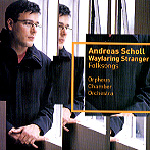Beginning with his early decisions regarding the course of his vocal development and running through his selection of roles, repertoire, and recording programs, countertenor Andreas Scholl so far has tended to make effective and purposeful choices. This release featuring 17 English/Scottish/Irish/American folksongs is another success. Although the ambitious chamber orchestra arrangements by Craig Leon (who also produced the recording) sometimes threaten to overwhelm the simplicity–the very essence–of the songs, Scholl’s commanding–make that mesmerizing–way with these tunes and his warm, expressive voice ultimately carry the day and keep us focused on the melodies and their down-to-earth texts. This is possible not only because he loves the music (the program was Scholl’s idea) but because he delivers it so easily and freely, without affectation and in impeccable English. Although in the notes arranger Leon claims his intent was “not to ‘develop’ the material”, his setting of “I will give my love an apple” seems overly fussy in this draggy, worried-over rendition. The generally voice-friendly sound varies depending on which and how many instruments are accompanying Scholl’s voice. Fuller orchestral numbers sound more like the singer is in the middle of the ensemble rather than out front. The string quartet intro to “Barbara Allen” is oddly balanced and slightly too close.
The performances succeed when Scholl and his partners just leave the tunes alone and focus on their simple beauty; they don’t work as well when the performers try too hard to find profundity in texts such as “I will give my love an apple” or “My love is like a red, red rose”. Scholl does score positively, however, with his respectably un-corny effort at capturing an Appalachian-flavored singing style for the tune “Charming beauty bright”, a song known by several other titles and in many other versions (including one sung by the Carter Family). There are many nice touches such as the little a cappella ending to “Blow the wind southerly” and a similar context for the opening of the next track, “The wife of Usher’s Well”, and the use of lute, dulcimer, banjo, and harp adds welcome color. (And could that be Scholl himself in a briefly baritonal appearance as the unnamed singer in sections of the ballad “Henry Martin” and “The wraggle taggle gypsies, o!”?) Scholl fans will love this relaxing, easy-on-the-ears recital, complemented by brief but informative descriptions of each song accompanying the fully printed texts.
































